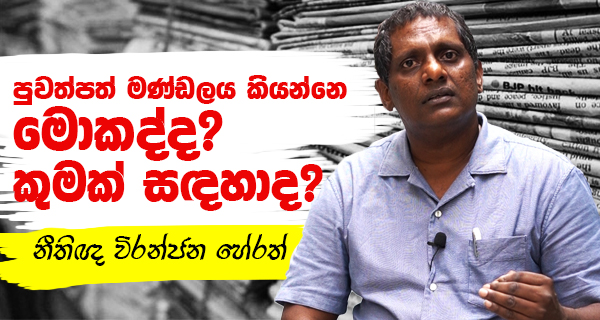The government has stated that they have taken a cabinet decision to amend the Press Council Act of 1973 to affect electronic and social media. It is not clear here what the idea here is. But we know that the Press Council Act is being implemented under the guise of regulating newspapers and maintaining the relevant ethics and maintaining media freedom. This has introduced a methodology for the regulation of newspapers. A Press Council has been introduced for this purpose. So, although it is not clear how this amendment will work, it seems to us that this Press Council is trying to make an amendment and provide an opportunity to cover social media and electronic media. In that sense, it is an extension of the powers that be.
The problem here is whether we know exactly what the Press Council Act is. Simply put, this is a bill brought in 1973. By 1973 there was no media except newspapers. Radio was at the state level, there was no television, there was no social media. So the question of whether a bill brought for newspapers can be applied to social media and electronic media with the same minor amendments is fundamentally affecting here. There are a lot of things in this bill that are not really possible. The idea is that it does not fit. This cannot be subjected to a minor amendment. Also, there are a lot of problems here with this bill.
If we talk about the negative aspects, it is important to maintain a Press Council. Seven persons [members] will be appointed to this Press Council. One is the Director of Government Information. The other six are appointed by the President. One of them is appointed to represent journalists and the other to represent media organizations. But the appointing authority appointed by all these six is the President. Next we know that the Director of News will be officially appointed, who will appoint him to that post? He appoints the president. In the final analysis, this board is a government board consisting of six government officials appointed by the President. It can be said that it is a board appointed by the President.
Then the complaints are heard, the relevant decisions are taken, everything is done by a board appointed by the government or the President. So it goes without saying that allowing such a board to regulate electronic media and social media is a matter of media freedom. Also, if we look at the clauses in the Act, one of the clauses here states that the orders here, that is, an order / order made by the Press Council, is a final order. The idea is that this order cannot be challenged in any other court. There is no system in place to make such appeals. And how fair is it to hand over such media regulation to a board that can give final orders?
The next point is that it can initiate and prosecute on its own merits or complaints on the basis of certain offenses. In the power to hear complaints, they have the power to make certain orders, to convict individuals, and to execute decisions. For example, if a newspaper article or feature about something immoral is published, a correction may be issued. It can also be punished in that regard. It is said that the activities of this board are carried out with the powers of a district court.
If we talk further about the penalties that can be given to this board, this bill has the power to impose imprisonment [not more than two years] or a fine not exceeding Rs. 5000 or both. We need to look at the severity of the bill when it comes to issues such as being a panel appointed by the President, having such powers and not being able to appeal decisions. Failure to comply with the orders of this Board may result in contempt of the Supreme Court. We know that insulting the Supreme Court of Sri Lanka is not a situation established by a formal legal system. There is no specific law regarding the punishment given to it. So in such a context I explained the shortcomings and weaknesses that we can simply identify. Also, there are several places where media freedom can be identified as unfavorable.
There are provisions in this Act which deprive the freedom of expression and speech, the freedom of the media, of those who are affected. Taken as a whole, this bill is outdated, outdated, and out of date. So there is a greater danger in bringing in a few amendments to a bill like this that was brought to the newspapers in 1973 to apply to the electronic media as well as to social media today. Therefore, my position is not to amend this Act but to abolish it. By that I do not mean that there should be no code of ethics for the media, nor should there be any regulation. There must be some regulation for the media. But it must be a body with broad representation on the part of media organizations, journalists and media representatives, giving priority to self-regulation and implementing those decisions. Such boards are widely used in the world today for media regulatory purposes. So the government should focus on such a concept. Otherwise, restoring the outdated laws is not a solution to the problems of the media but to abolish the freedom of the media at this time.
